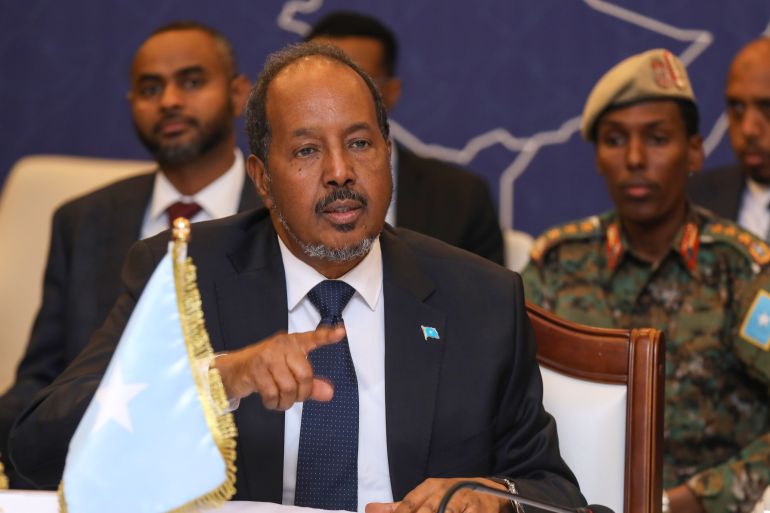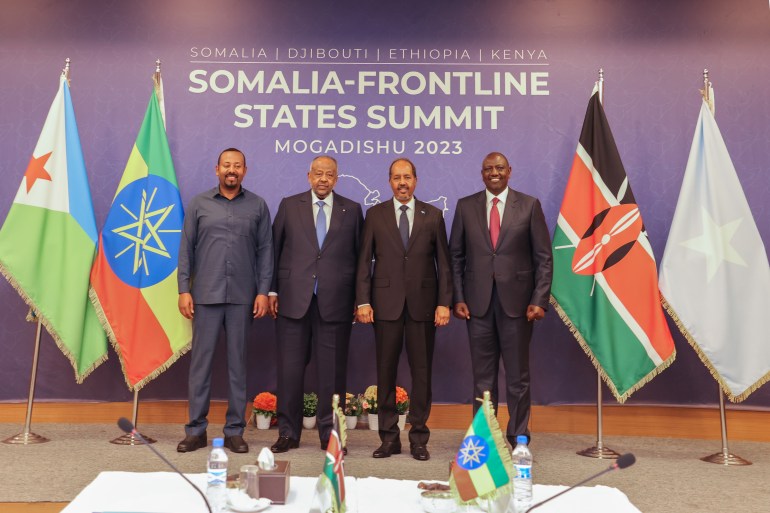Somalia hosts regional summit to discuss fighting al-Shabab
Somalia, Kenya, Ethiopia and Djibouti are set to discuss a joint military offensive against the al-Qaeda affiliate.

Somalia is hosting a summit of leaders from several neighbouring countries in the Horn of Africa to discuss the fight against al-Shabab, as a wide-ranging offensive against the armed group gathers pace.
The meeting in the capital, Mogadishu, drew leaders from three “brotherly neighbouring countries”, the Somali presidency said, posting pictures of the arrival of Kenya’s William Ruto, Djibouti’s Ismail Omar Guelleh and Ethiopian Prime Minister Abiy Ahmed.
Keep reading
list of 3 itemsAl-Shabab carries out car bomb attack in Somalia, 15 killed
Armed fighters kill six during village raid in Somalia
President of the Republic of Kenya H.E @Williamsruto lands in Mogadishu for the joint Heads of state & Government summit to support H.E @Hassansmohamud's efforts to enhance regional security & the elimination of international terrorism for the safety & prosperity of our region. pic.twitter.com/ruMzxHDrrY
— Villa Somalia (@TheVillaSomalia) February 1, 2023
Somali leader Hassan Sheikh Mohamud and his counterparts are due to discuss a coordinated military offensive against the al-Qaeda-linked group, which has been waging a fight in the Horn of Africa nation for more than 15 years.
Security was beefed up in the city with movement restrictions and military patrols. Commercial flights have also been suspended.
“The major roads and streets in the city are closed today and there is no civilian movement allowed,” Abdulahi Hassan, a member of the national security agency, told AFP news agency.
The armed group earlier this month claimed responsibility for the deadly bombing and storming of a government building in Mogadishu that injured 16 people. Six members of the group were killed by security forces.
After taking office in May last year, Mohamud declared an “all-out war” on the fighters, rallying Somalis to help flush out members of the armed group he described as “bedbugs”.
In recent months, the army and local clan militias have retaken chunks of territory in an operation backed by US air raids and an African Union (AU) force known as ATMIS.

But the fighters who were forced out of the capital by AU troops in 2011 have frequently retaliated against the latest offensive with bloody strikes.
Despite being driven out of urban centres, the group remains entrenched in the countryside from where it has conducted numerous attacks in Somalia and neighbouring countries.
In the deadliest al-Shabab attack since the offensive was launched last year, more than 100 people were killed in two car bomb explosions at the education ministry in the capital in October.
The group has also been active recently across the border in eastern Kenya. Security forces killed 10 al-Shabab fighters earlier this month, a Kenyan government official said, and recovered rocket-propelled grenades and improvised explosive devices.
In 2013, four young men armed with automatic rifles and grenades charged into the Westgate Mall in the uptown Westlands district of the Kenyan capital, Nairobi. They went on a rampage, killing 68 people and injuring hundreds more, and sparking a traumatic four-day standoff with the Kenyan military.
Kenya is a contributor to ATMIS, the 20,000-strong AU force formerly known as AMISOM, which has a more offensive remit than its predecessor. The force is also drawn from Uganda, Burundi, Djibouti and Ethiopia, with troops deployed in southern and central Somalia.
The meeting comes a day after defence ministers and security chiefs of the four countries met in Mogadishu to prepare for the summit.
“This collaboration is expected to lead to the quick liberation of the country from the Kharijites [renegades] who have been dealt heavy blows on the battlefield in the past few weeks,” the Somali government said on Tuesday, using a government term for al-Shabab.